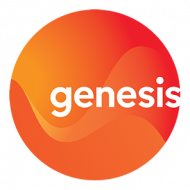
What is EVerywhere?
EVerywhere is a new scheme from Genesis Energy. Genesis customers on its EV plan can use ChargeNet’s network of public charging stations for the same price they’d pay at home, instead of paying the standard (and more expensive) public charging rates.
How does it work?
EVerywhere works by linking your ChargeNet account to your Genesis Energy IQ app. When you charge your EV, the amount you pay through your ChargeNet account is synced to match your current home power rate.
The charges are then included as part of your regular Genesis Energy bill.

How much does public charging typically cost?
At most public charging stations, the average rate is usually around $10 for 100km of charge. While that’s still significantly cheaper than what you’d pay at the gas pump to travel the same distance in a petrol car, it’s also significantly more expensive than what you pay to charge at home.
On average, charging at home only costs about $3 for 100km of charge. Although, with the right EV power plan, you could end up paying about half of that amount, or even less!
→Related article: Electric Cars vs. Petrol Cars: Costs and Savings
How fast is public charging?
The actual speed varies based on factors such as the model of your car, the age of the battery, and the charger itself. But broadly speaking, ChargeNet advises that just 15 minutes of charging will provide:
- 2km of range on a standard 2kw at-home charger
- 10km of range on a standard 7kw at-home charger
- 33km of range on a 25w fast charger
- 66km of range on a 50w fast charger
- 400km of range on a 300w fast charger
How do I get EVerywhere?
EVerywhere is an add-on to Genesis Energy’s existing EV power plan. To be eligible for the EVerywhere scheme you must:
- Be a Genesis residential electricity customer on the Energy EV Plan
- Use your EV for private use at all times
- Have an active account with ChargeNet
- Have a single ChargeNet account linked to Genesis and;
- Provide Genesis with the email address and account number of your ChargeNet account which we will share with ChargeNet for the purpose of linking the two accounts
Compare electricity providers for free with Canstar Blue!
What else do I need to know?
- You can use EVerywhere at 25w, 50w, and 300w ChargeNet stations for no extra cost. 50w and 300w chargers usually cost more than 25w options
- Your ChargeNet account balance must be at zero, otherwise, you will be charged the full ChargeNet rate
- Some ChargeNet locations are excluded from the promotion
- Billing will appear through your Genesis account
- Other potential ChargeNet costs, such as idle and fob key charges, are not covered by Genesis
- Of the ChargeNet rate turns out to be lower than what you would have paid at home, Genesis will charge you the cheaper ChargeNet price
For more details and terms and conditions, visit the Genesis website here.
Is EVerywhere worth it?
This will mainly come down to you and your habits.
If you already use public charging stations regularly, then EVerywhere could offer some serious savings. Based on the above figures, about $7 each charge!
But if you very rarely use public chargers, then EVerywhere will probably offer you little benefit. As EVerywhere doesn’t provide any further discounts for at-home charging. Although Genesis’ EV plan does offer half-priced power from 9pm-midnight every day.
However, if your only reason for avoiding public chargers is the cost then you might find EVerywhere removes that barrier, and provides you with the convenience and confidence to take your EV further. After all, Genesis states that range anxiety is one of the biggest issues that plague EV owners. So providing low-cost on-the-go charging can certainly help with this.
If you don’t intend on using public chargers…
If you have a fast charger installed at home or are happy charging at home slowly, again, EVerywhere probably won’t offer much benefit. In this case, you’ll want to pay the cheapest rates possible for at-home charging, which may or may not be from Genesis.
If you’re an EV owner you might find opting for a provider that provides cheaper off-peak power, or even free power, is better suited to getting the most out of at-home charging. Especially as you can also use the cheaper power hours to run your dryer, take a long shower, and warm your home.
→Related article: Peak and Off-Peak Electricity Prices Explained

Compare electricity providers with Canstar Blue
If you are looking to change electricity providers, or are unsure if you are getting the best deal, Canstar Blue can help. We rate NZ power companies for customer satisfaction and value for money, see the table below for some of the results, or you can click on the button below for the full results of our survey.
Canstar Blue’s latest review of NZ power companies compares them on customer satisfaction. The table below is an abridged version of our full results, available here.
^ By clicking on a brand or 'details' button, you will leave Canstar Blue and be taken to either a product provider website or a Canstar Blue NZ brand page. You agree that Canstar Blue NZ’s terms and conditions apply (without limitation) to your use of this service,to any referral to a product provider from our website, and any transaction that follows. Canstar Blue may earn a fee for referrals from its website tables, and from sponsorship (advertising) of certain products. Payment of sponsorship fees does not influence the star rating that Canstar Blue awards to a sponsored product. Fees payable by product providers for referrals and sponsorship may vary between providers, website position, and revenue model. Sponsorship fees may be higher than referral fees. Sponsored products are clearly disclosed as such on website pages. They may appear in a number of areas of the website such as in comparison tables, on hub pages and in articles. Sponsored products may be displayed in a fixed position in a table, regardless of the product’s rating, price or other attributes. The table position of a sponsored product does not indicate any ranking, rating or endorsement by Canstar Blue. See How we are funded for further details.
Canstar Blue NZ Research finalised in April 2023, published in June 2023.
See Our Ratings Methodology
Compare electricity providers for free with Canstar Blue!

About the author of this page
This report was written by Canstar Content Producer, Andrew Broadley. Andrew is an experienced writer with a wide range of industry experience. Starting out, he cut his teeth working as a writer for print and online magazines, and he has worked in both journalism and editorial roles. His content has covered lifestyle and culture, marketing and, more recently, finance for Canstar.
Enjoy reading this article?
You can like us on Facebook and get social, or sign up to receive more news like this straight to your inbox.
By subscribing you agree to the Canstar Privacy Policy


Share this article